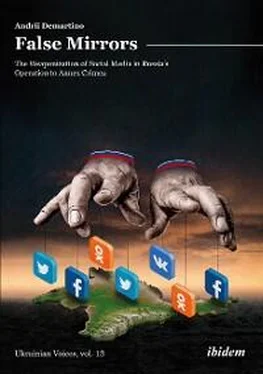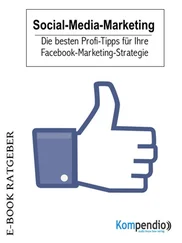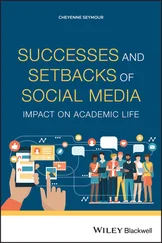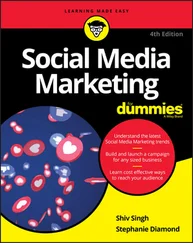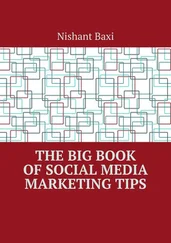Almost all researchers recognise the role of social media as a crucial and state-of-the-art “type of weapons,” although it remains the least studied. The situation is complicated by the absence of methodologies for assessing the effectiveness of information influence, which hinders the objective analysis of the role and significance of social media in the Crimean events of 2014. At the same time, the recognition of the information component’s importance has become an indisputable imperative for a wide range of scientific studies. Considering the above, the research into the use of social media by the military-political leadership of the RF in the operation to annex the AR of Crimea is extremely relevant.
The main problem of the existing research on the topic done by national and foreign scholars is that these studies are too theoretical, rely on rather limited sources, tend to use overly general approaches and definitions, and repeat the same facts and conclusions. Consequently, a wide range of practical techniques and methods of Russian information influence have not received sufficient attention.
Nevertheless, it is worth noting the meticulous analysis of the theoretical foundations of the RF’s information warfare, as exemplified by its most revealing Crimean operation: the analysis of goals and objectives, the audience, channels, key themes, methods and techniques, psychological and manipulative techniques applied, the examples of falsification, and historical narratives used. All of this has made a significant contribution to history, psychology, sociology, public relations, information security, and military science.
However, in terms of applying information and communication technologies, the very techniques of their implementation are not elaborated upon: where, by whom, how, when, and in what way they were employed. As a rule, widely made assertions that Russia used social media extensively during the annexation of the AR of Crimea are insufficiently supported by facts. The real mechanism of the functioning of the Russian “information warfare machine” remains unstudied. Thus, the crimes of the Russian information aggression committed during the annexation of the AR of Crimea are not associated with any names and surnames, dates and places, conditions and reasons, which is important not only for the objectivity of scientific understanding of the problem but also for devising effective countermeasures and enabling Ukraine to file cases in international judicial and law enforcement institutions.
While agreeing with Yu. Fedorov (2016) who warns against excessive theorising and deflecting attention away from analysing Russia’s seizure of Crimea and the operation in eastern Ukraine, it’s worth noting that the difficulty of examining the information component of hybrid warfare is largely related to the novelty of the phenomenon. New situations put new issues on the agenda, which have not arisen before; therefore, there is no experience of solving these problems. A notable example is the emergence of a phenomenon that can be called an online mirage, i.e. the illusion of an unlimited amount of factual material under the conditions of its ultrafast self-destruction or deliberate deletion. The world of modern communication technologies is shaping an entirely new information reality—the opportunity to instantly create and permanently delete content that may constitute an important historical source. For example, groups and communities created or functioning under surveillance by Russian intelligence agencies, which had intentionally engaged in anti-Ukrainian activity, were “mopped up.” Therefore, scholars do not have access to the materials in question.
Moreover, some part of research needs to be conducted at the time when events unfold, in particular, monitoring the mass media space to identify the technical aspects of waging information campaigns by Russian intelligence agencies, such as key messages, sources, publishing frequency, speakers, semantic relations, and links between groups/communities and accounts. In this case, the factor of time is crucial to making a correct and accurate assessment, since information is being destroyed, or it is becoming difficult to access under the layers of “junk information.” As to studies by Russian scholars, despite being actively involved in meticulous research work in the field of information security and cybersecurity, there is a conspiracy of silence about the “Crimean events”—propaganda or nothing.
This research does not aim to cover all the aspects of Russian information warfare in the operation to annex the AR of Crimea in 2014. It attempts to reconstruct the facts and events related to the techniques of using social media for fulfilling aggressive foreign policy tasks by the leadership of the RF. The study investigates one of the tools of new-type warfare, which can lay a foundation for further comprehensive analysis. Performing systematic and structural-functional analysis makes it possible to study the mechanism and principles of the Russian information machine’s functioning in depth and suggest adequate countermeasures, which will contribute to strengthening the national security of Ukraine. This objective is especially relevant against the backdrop of the increasing influence of social media on every sphere of life and the ongoing aggressive policy of the Kremlin towards Ukraine, which requires continuous analysis and an appropriate response. The results of this research can also be used by the authorities in Ukraine and NATO member states and by international institutions for devising strategies, doctrines, instructions, and methods for countering Russian information expansion.
Конец ознакомительного фрагмента.
Текст предоставлен ООО «ЛитРес».
Прочитайте эту книгу целиком, купив полную легальную версию на ЛитРес.
Безопасно оплатить книгу можно банковской картой Visa, MasterCard, Maestro, со счета мобильного телефона, с платежного терминала, в салоне МТС или Связной, через PayPal, WebMoney, Яндекс.Деньги, QIWI Кошелек, бонусными картами или другим удобным Вам способом.
